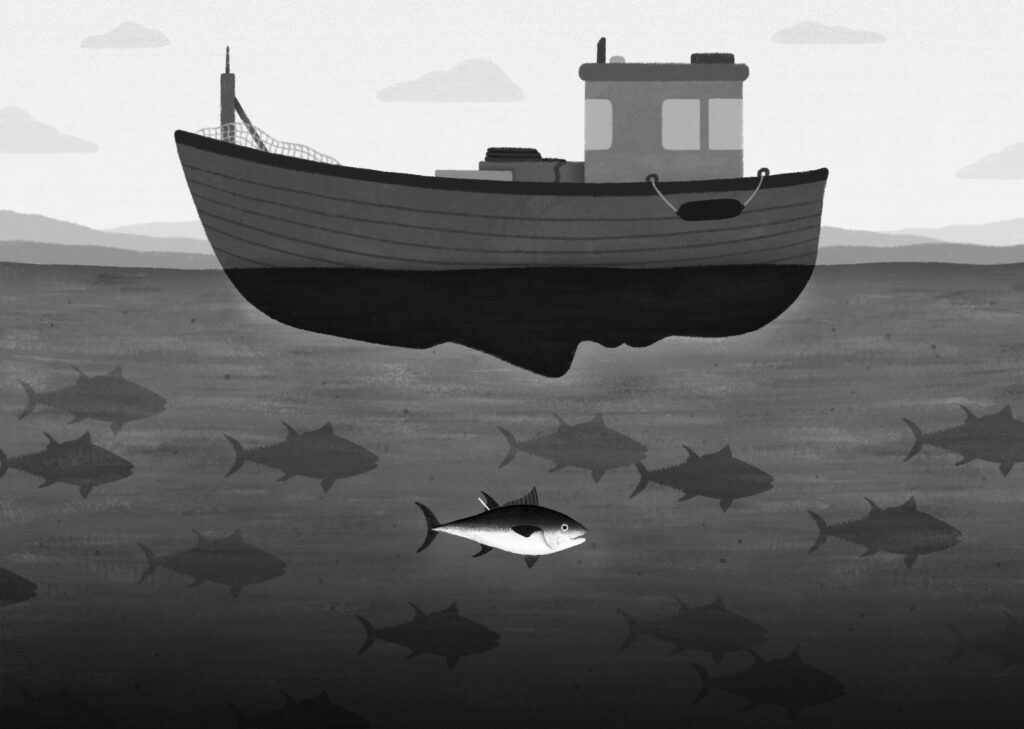An unexpected call from an American marine biologist gave the Canadian journalist Karen Pinchin the lead of a lifetime. It was a Sunday afternoon in 2018 when Molly Lutcavage phoned Pinchin to share some astonishing news of a large fish and a yellow identity marker known as a spaghetti tag: the same bluefin tuna that Lutcavage had caught and released more than a decade earlier off of Cape Cod, Massachusetts, had been caught once again, this time near southern Portugal.
The transatlantic journey earned the bluefin the nickname Amelia, after the aviation pioneer Amelia Earhart, and prompted a scientific aha moment. For years, conventional wisdom separated North American and European populations of North Atlantic bluefin tuna, and since 1981 an international agreement had bisected the ocean into eastern and western zones for managing the fish stocks. We now know that line is “entirely theoretical,” writes Pinchin, “except to the extent that it controls a billion-dollar industry and has allowed humans to run roughshod over one of the world’s most contested species.”
Atlantic bluefin tuna is the largest and most endangered of the world’s three bluefin species (the others being Pacific and Southern). As Pinchin explains in Kings of Their Own Ocean, its very existence has come to represent “the health of our oceans and the overfishing that besieges them.” Throughout, Pinchin is as strong on science and history as she is on narrative and memoir — earning her book a place among celebrated global food microhistories, such as Mark Kurlansky’s Cod. In this master class of environmental reporting, she describes a “bristling school of Atlantic bluefin tuna sliced above an inky-blue landscape of sandy sea bottom” and global bluefin tuna populations that have “surfed the curling edge of collapse” since the 1970s. “This story drew me in, spun me around, and spat me out, encapsulating the incomprehensible scale and small cruelties of our modern existence on this planet,” she explains in her prologue.
It’s Amelia, in particular, that holds Pinchin’s (and the reader’s) attention throughout this tale. We learn the fish was caught three times. In 2004, Al Anderson, a charter captain turned citizen scientist, reeled her in off the coast of Massachusetts. She weighed ten pounds. Anderson tagged and released her, as he had done with countless other bluefins. In 2007, Lutcavage caught Amelia, now ninety pounds, near Cape Cod. As Pinchin puts it, the scientist realized her team “had captured an incredible needle in a haystack: a large tuna that had already been tagged once before.” Finally, in 2018, Amelia was pulled out of the water by a Portuguese commercial fisherman, who pegged the fish at 600 pounds.

An engrossing view of the bluefin fishery.
Paige Stampatori
Kings of Their Own Ocean takes readers from Anderson’s Rhode Island basement, where he once spooled his own fishing line, to the precise spot where Amelia was captured that final time, and from Tokyo to Madrid, where the world’s largest fish markets commonly slap bluefins onto the chopping block. Pinchin herself never met the skipper or saw Amelia alive (both died in 2018), but her narrative is filled with rich descriptions of both.
The physical accounts are one thing: Anderson was “tall, anvil-headed,” for example, “with a wiry mass of black hair and his trademark trimmed mustache,” while Amelia had “iridescent, gray-blue skin” that “gleamed and refracted the light like a scarab.” But Pinchin excels when recounting the rich lives of her main characters: a career fisherman so moved by seeing a beloved species precariously close to collapse that he redirects his energy toward saving it; and an intrepid animal, which has helped us see its kind and an ocean differently. Especially poignant is how their lives were almost cosmically intertwined with each other and with key points in history, including the globalization of the fishing industry. We come to care deeply about the fisherman, understanding his love for the work, and for the fish, understanding its intrinsic value as much more than “red gold.”
Occasionally, superfluous details get in the way of the book’s overarching narrative, among them numerous references to Anderson’s drinking problem. Yet even these detours speak to the lengths to which Pinchin was willing to go to portray him as a real person, deeply flawed but capable of remarkable things, like scientifically tagging some 60,000 Atlantic game fish.
In writing this book, Pinchin talked to everyone in Anderson’s circle: his wife, colleagues, and friends. She dug through troves of papers, photographs, and videos and began to track the bluefin trade across oceans and continents. All the while, she came to better understand the deep connection between fish and fishermen, the troubled waters of global fishing rights, the dangers of bluefin poaching, and the precarious future of a wild food supply. “I’ve ultimately come to believe that as a global community,” she writes near the end, “we are collectively only ever a few terrible choices away from wiping out any ocean species.” As Captain Anderson believed, however, individuals can make a difference. Not everyone can take action in a boat, but we can at the table, by paying closer attention “to the fish we eat, where we’re buying those fish from, and how those fish are managed, caught, distributed, and sold to us.” Even as Kings of Their Own Ocean sounds the depths to which humans are willing to go to deplete the oceans, it speaks to ways we might actually sustain them.
Jenn Thornhill Verma is a journalist covering fisheries, oceans, and climate change.

